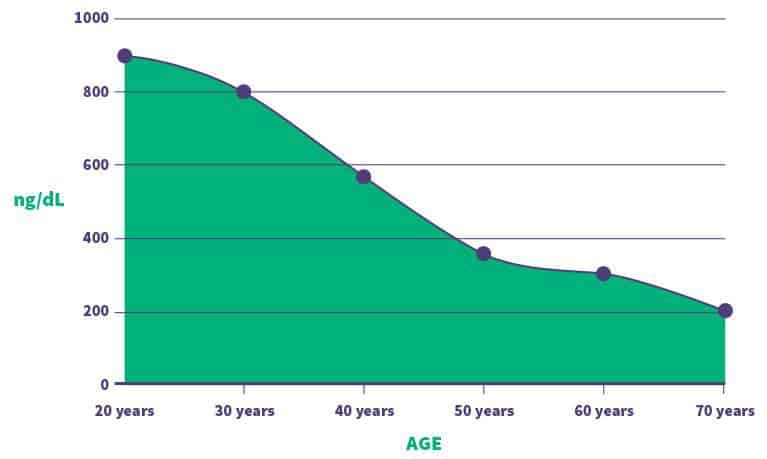DHEA And Testosterone: How It Helps Men Achieve Increased Free T
Fact Checked On: 5-29-2018 By: Rob MillerHome » testo-no-ads » DHEA And Testosterone: How It Helps Men Achieve Increased Free T
Contents
DHEA And Testosterone
Health Benefits of DHEA
Clinical Studies of DHEA and Testosterone
Does DHEA Increase Testosterone
Frequently Asked Questions
The Bottom Line On DHEA
Guys, listen up: Once you reach the age of 30, your testosterone levels peak and begin a slow decline.
This happens with everyone; however, the rate at which your testosterone levels drop depend heavily on lifestyle.

If you’re sedentary, eating a terrible diet high in sugar and unhealthy fats, smoking weed / drinking alcohol in excess, not getting enough sleep, and not supplementing with proven testosterone boosting supplements, your decline will look more like a free fall.
If you’re already exercising and eating well, one of the best things that you can do for yourself is find an effective and proven testosterone booster.
Introducing DHEA.
DHEA has been widely popular among the bodybuilding crowd for years but is it all that it’s cracked up to be?
Let’s take a look at DHEA, its potential benefits, and what science has to say about it.
DHEA And Testosterone?
Dehydroepiandrosterone, more commonly known as DHEA, is a hormone produced in the body that is associated with a group of compounds that slowly decrease as we age.
Low levels of DHEA are associated with higher rates of depression, weight gain, and risk of disease.
DHEA has a relationship with testosterone in the body but to what extent DHEA supplements will increase testosterone is what I’ll discuss below.
Health Benefits of DHEA
Before I jump into whether or not DHEA is effective at boosting testosterone levels, let’s review some of the other benefits that it is associated with:
- DHEA may be able to fight depression and improve overall mood and well-being.
- DHEA may act as an effective anti-inflammatory, alleviating pain related to joints and connective tissue
- DHEA may protect brain health while supporting cognitive development and learning processes
Clinical Studies of DHEA and Testosterone
DHEA is one of those ingredients that has fierce advocates and even fiercer critics.
So what does the science say about DHEA and specifically its ability to raise testosterone levels?
Study One
A study published in Clinical Endocrinology provided both men and women with 100 mg a day of a DHEA supplement for 6 months. The results?
Not what you’d expect for this supposed anabolic wonder supplement.
Men
- Did not see a difference in testosterone levels
- Did see an elevation in levels of serum insulin-like growth factor 1 (IGF-1) – This is important as IGF-1 has been shown to reduce sex hormone binding globulin (SHBG)
- Body fat mass decreased
- Strength increased (knee and lumbar back strength)
Women
- No increase in testosterone
- No fat loss
- Increase in total body mass (that’s right, women gained weight in this study)
- Increase in strength but not as much as the men (1)
Study Two
In another study published in European Journal of Applied Physiology, men were given 50 mg of DHEA 12 hours before a workout session of high intensity interval training.
H.I.I.T. may be an incredible way to exercise but it’s also been shown to lower testosterone levels in untrained men. This study focused on what would happen if untrained men were given DHEA before a H.I.I.T. workout.
The results were interesting: While DHEA had no effect on total testosterone in the body, it did keep free testosterone levels elevated after the workout.
That’s right, if you’ve never exercised a day in your life before, you may want to hold off on H.I.I.T. workouts… unless you have DHEA. I’ll talk more about these implications below.
Study Three
Lastly, a study published in the Journal of Clinical Endocrinology and Metabolism: I found this to be the most interesting study out there.
The basis behind this study is this:
When we age, levels of androgens and growth hormones decline with testosterone, IGF-1, and DHEA being the most notable.
Researchers believe that with the decline of these androgens, our bodies switch from anabolic states to more catabolic or breakdown states.
This isn’t good news for muscle, connective tissue, brain health, or just about anything in the body.
Scientists provided a small group of men and women with 50 mg of DHEA over the course of the study.
Here are the highlights of the results:
Men
- DHEA and DS serum levels were restored
- No increase in testosterone
- Slight increase in androstenedione
- IGF-I levels increased significantly
Women
- DHEA and DS serum levels were restored
- Increases in androstenedione, testosterone, and dihydrotestosterone
- IGF-I levels increased significantly
Here’s the really fascinating part: Both men and women reported an increase in “perceived physical and psychological well-being.” Considering low androgen levels are often accompanied by symptoms such as depression and a low sex-drive, DHEA supplementation supported both mood and libido. (3)
Does DHEA Increase Testosterone?
Let’s set science aside and get to the most important question: Will DHEA increase your testosterone levels?
It depends on which type of testosterone you’re asking about.
Unfortunately, DHEA does not increase total testosterone levels but studies suggest that it may boost your free testosterone levels.
What’s the difference?
Think of total testosterone as the umbrella term for the active and inactive testosterone in your body.
Free testosterone is a part of total testosterone and it plays a unique function in actively supporting anabolic processes such as muscle building.
While DHEA can’t increase total testosterone levels, it may play a part in boosting free, or unbound and active testosterone.
This has huge implications for those people who are beginning high intensity exercise programs and for those looking to promote an anabolic environment for muscle building.
If you’re looking to get huge, one thing to consider is that you would have to also ensure that your levels of sex hormone binding globulin (SHBG) are low so that free testosterone levels remain high to support anabolism.
Frequently Asked Questions
How much DHEA should I take?
- Studies used dosages of 50 mg and 100 mg. Find a DHEA supplement that provides you with no less than 50 mg per serving and no more than 100 mg per serving.
Can women take DHEA?
- Yes, DHEA is safe for women to take but it’s important to remember that studies show DHEA increases androgens and total body mass for women. Higher levels of testosterone in women may result in symptoms such as a deeper voice, menstrual irregularity, more body hair especially on the face, and balding.
What are the Side Effects of DHEA Supplements?
- While safe in small cycles, DHEA supplements can produce a number of side effects if taken in large quantities over a long period of time (greater than 4 to 6 weeks).
Side effects include acne, balding, high blood pressure, and mood swings.
For women, side effects may include menstrual irregularity, deepening of the voice, and more body hair especially on the face.
The Bottom Line On DHEA
Studies have concluded that DHEA does not raise your total testosterone levels; however, it does temporarily increase your levels of free testosterone.
While DHEA is not a long-term solution to falling androgens levels due to aging, it may be of use to anyone who is untrained and looking to begin an intense exercise program or people who want to focus on promoting muscle mass gains.
In either case, I’d recommend taking DHEA as a cycle supplement and following up with a light PCT.
Yes, DHEA does not increase total testosterone levels but it is better to be safe rather than sorry when it comes to finishing up a bottle of DHEA.
As I mentioned above, if you’re going to use DHEA, I’d recommend pairing it with a vitamin D and boron supplement.
These additional supplements will help lower your levels of SHBG, which in turn will raise free testosterone levels even more.
References
- Morales AJ, Haubrich RH, Hwang JY, Asakura H, Yen SS.
The effect of six months treatment with a 100 mg daily dose of dehydroepiandrosterone (DHEA) on circulating sex steroids, body composition and muscle strength in age-advanced men and women. Clin Endocrinol (Oxf). 1998 Oct;49(4):421-32. - Liu TC, Lin CH, Huang CY, Ivy JL, Kuo CH.
Effect of acute DHEA administration on free testosterone in middle-aged and young men following high-intensity interval training.
Eur J Appl Physiol. 2013 Jul;113(7):1783-92. doi: 10.1007/s00421-013-2607-x.
Epub 2013 Feb 17. - Morales AJ, Nolan JJ, Nelson JC, Yen SS.
Effects of replacement dose of dehydroepiandrosterone in men and women of advancing age.
J Clin Endocrinol Metab. 1994 Jun;78(6):1360-7.




